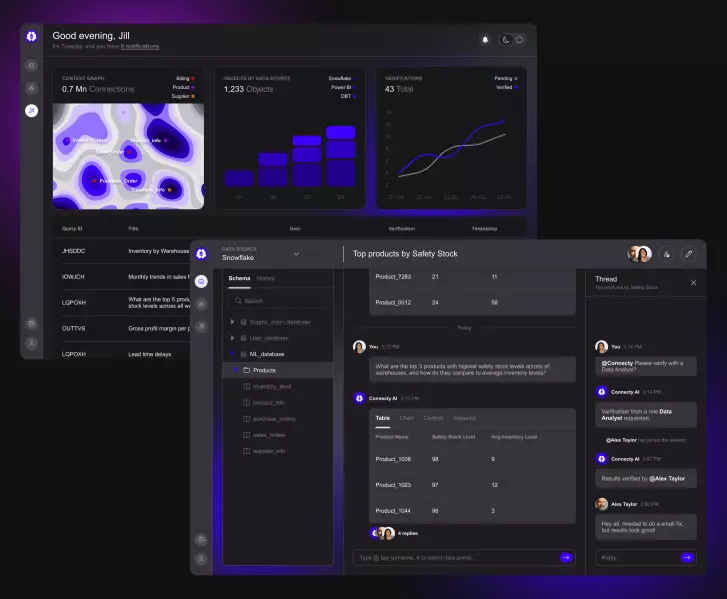In the realm of enterprise data management, chaos often reigns supreme. Companies find themselves grappling with a myriad of data sources, scattered across multi-cloud platforms, while attempting to derive meaningful insights from a fragmented data landscape. The challenges of managing such complex ecosystems continue to mount as structured and unstructured data proliferate. With numerous AI, business intelligence (BI), and chatbot applications consuming these diverse datasets, the need for an innovative solution has never been more critical. This is where Connecty AI, a startup emerging from stealth mode in San Francisco, aims to make a significant impact with its unique context-aware platform.
Connecty AI’s principal offering is its contextual engine, designed to traverse and make sense of enterprises’ comprehensive data pipelines. Its main goal is to transform the chaotic influx of information into a streamlined and coherent system of insights. By actively analyzing and interlinking various data points, Connecty AI is not just another tool; it’s a transformative solution that brings real-time context to business operations. This contextual awareness is key to automating data-related tasks and providing actionable insights that can drive strategic decision-making.
The founders, Aish Agarwal and Peter Wisniewski, bring a wealth of experience from the data value chain, where they encountered firsthand the intricacies of managing a fragmented data architecture. They recognized that the struggle to effectively harness the nuances of scattered business data was a fundamental issue plaguing many organizations. Thus, the inception of Connecty began with the ambition to alleviate the manual labor traditionally associated with data preparation, mapping, and analysis.
A Deep Dive into the Context Engine
At the heart of Connecty AI is its proprietary context engine. This technology enables real-time extraction, connection, and enhancement of data from various sources through no-code integrations. It reflects a shift away from static schema interpretations, embracing a more dynamic approach to data understanding. As Agarwal elaborates, the engine utilizes a combination of vector databases, graph databases, and structured data to construct a “context graph.” This graph serves as a comprehensive repository that captures the relationships between disparate data elements, thereby providing a nuanced, interconnected view of all information relevant to an enterprise.
Once the context graph is established, the platform generates a personalized semantic layer for each user. This layer is not merely an organizational tool; it proactively crafts recommendations, updates documentation, and delivers insights relevant to the specific needs of diverse stakeholders. By employing deep context learning, Connecty AI aims to revolutionize how users interact with data, assisting in documenting business metrics shaped by intention, and ultimately enhancing the decision-making process.
One of the standout features of Connecty AI’s platform is its focus on empowering users through self-service capabilities. Product managers can now conduct ad-hoc analyses without relying heavily on technical teams. This autonomy is pivotal as it accelerates data-driven decision-making and fosters a culture of agility within organizations. By facilitating independent exploration of data, Connecty AI enhances productivity and reduces the burden on data teams, enabling them to focus on more strategic initiatives rather than being bogged down by routine data tasks.
Additionally, the platform’s “data agents” engage users in natural language, making data interaction accessible regardless of the user’s technical proficiency. This personalized experience ensures that every user, whether a technical expert or a novice, finds value in the insights generated, fostering a more inclusive data environment.
As the data management landscape continues to evolve, Connecty AI stands out among competitors, including established players such as Snowflake and emerging startups like DataGPT. While many companies in the market promise swift access to insights via language models, Connecty AI’s contextual graph-based approach delivers a more integrated solution that spans the entire data stack rather than isolated functionalities. This holistic perspective addresses the pressing need for a continually evolving understanding of data across various systems, ultimately leading to enhanced organizational performance.
Currently, Connecty AI is collaborating with several partner companies, including Kittl, Fiege, Mindtickle, and Dept, to refine its product in real-world applications. These partnerships have already yielded impressive results, significantly reducing data teams’ workload and accelerating the process of extracting actionable insights.
As organizations confront the ever-growing complexities of data, solutions like Connecty AI provide a beacon of hope. By revolutionizing how data is managed and understood, Connecty is poised to play a vital role in the future of enterprise data management. The journey is still in its early stages, but with plans to enhance its contextual engine and support additional data sources, Connecty AI appears ready to lead the charge in transforming how enterprises leverage their data for actionable insights. The ability to automate significant portions of data workflow not only increases efficiency but also represents a paradigm shift towards a more enlightened and responsive approach to business intelligence.


Leave a Reply